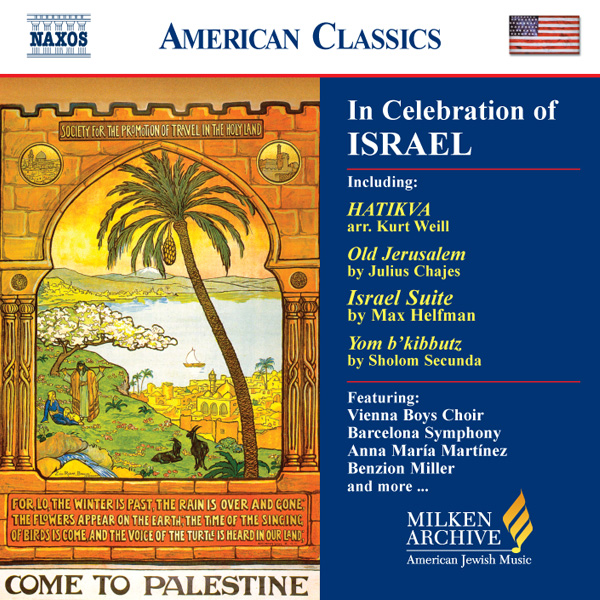Tracks
Liner Notes
For a symphonic concert piece about modern Israel, the origins of Secunda’s Yom b'kibbutz (A Day on a Kibbutz) might seem curious. By 1952, the popular American Yiddish theater of Second Avenue had already passed its zenith. With diminishing numbers of immigrant-era Yiddish-speaking audiences, and despite fervent denials by old-time aficionados and actors, it was already in its decline in the postwar period. Nonetheless, in October of that year, Secunda’s new Yiddish musical, Uncle Sam in Israel—with lyrics by Second Avenue veteran Chaim Tauber and a book by Benjamin Ressler—opened at New York’s Public Theater in the heart of the Second Avenue district. Starring Michael Rosenberg, Fyvush Finkel, Shifra Lehrer, and Bella Meisel, among others, it centered around the zealous commitment and selflessness of the pioneers and settlers in Palestine and the young State of Israel as they labored to rebuild a permanent Jewish homeland through agricultural settlements in the northern regions. The predictably banal (even for Second Avenue) plot concerned an American Jewess from Kentucky who, on a visit to Israel, becomes fired with idealism and decides to remain there with a group of immigrants—while her father arrives with grandiose plans for “civilizing” Israel in short order. Two months later, bowing to the changing demographics of potential audiences, and in an effort to attract younger crowds, the show was revised and reproduced afresh by Herman Yablokoff at the same theater in an English-language adaptation, with Yiddish punch lines and a few words of Yiddish as well as Hebrew sprinkled here and there.
Later, after the show’s run, Secunda extracted music from it to use as the basis for his tone poem Yom b’kibbutz, adding new musical material and reorchestrating for a much larger ensemble. The piece was intended to depict programmatically—and of course romantically—life on a typical kibbutz.
Despite its title and perhaps even its composer’s intent, this piece suggests more than kibbutz-related images, extending to a reflection of the resettling, rebuilding, and defense of modern Israel in general. Actually it appears to be a series of moments—intense, ecstatic, and even heroic, as well as pastoral. There are echoes of imagined night scenes on kibbutzim in the Galilee, replete with the expected strains of a distant Arabic shepherd flute—with which the piece opens and which recurs with variations—and modal hints of early settler songs that were adopted from Arabic folksong. But these give way to bombastic passages that could easily be heard as fierce battle scenes from the War of Independence or even earlier skirmishes, even if they were drawn from more thinly orchestrated kibbutz festival dance scenes or marches to the fields in the earlier Yiddish show. There are moments of calm but deliberate toil, others of fiery determination, and still others of cliff-hanging confrontation—all of which could be imagined as accompanying parts of a large-scale epic film. It is worth noting that Secunda once aspired fervently to compose for Hollywood and visited there in pursuit of that dream. But he was rebuffed by the studios and by influential Jews in the industry, in part because they felt that his music and his Yiddish theatrical persona were too ethnically oriented and too narrowly Jewish to resonate for the wider American cinema audiences of that time. In a way, though, what began here as Second Avenue pit music became something of a filmless film score that, with the right corresponding cinematic images, could probably have appealed to the general public a generation later.
Credits
Composer: Sholom SecundaPerformers: Rundfunk-Sinfonieorchester Berlin; Gerard Schwarz, Conductor
Publisher: Williamson Music
Coproduction with Deutschland Radio Kultur and the ROC Berlin GmbH
